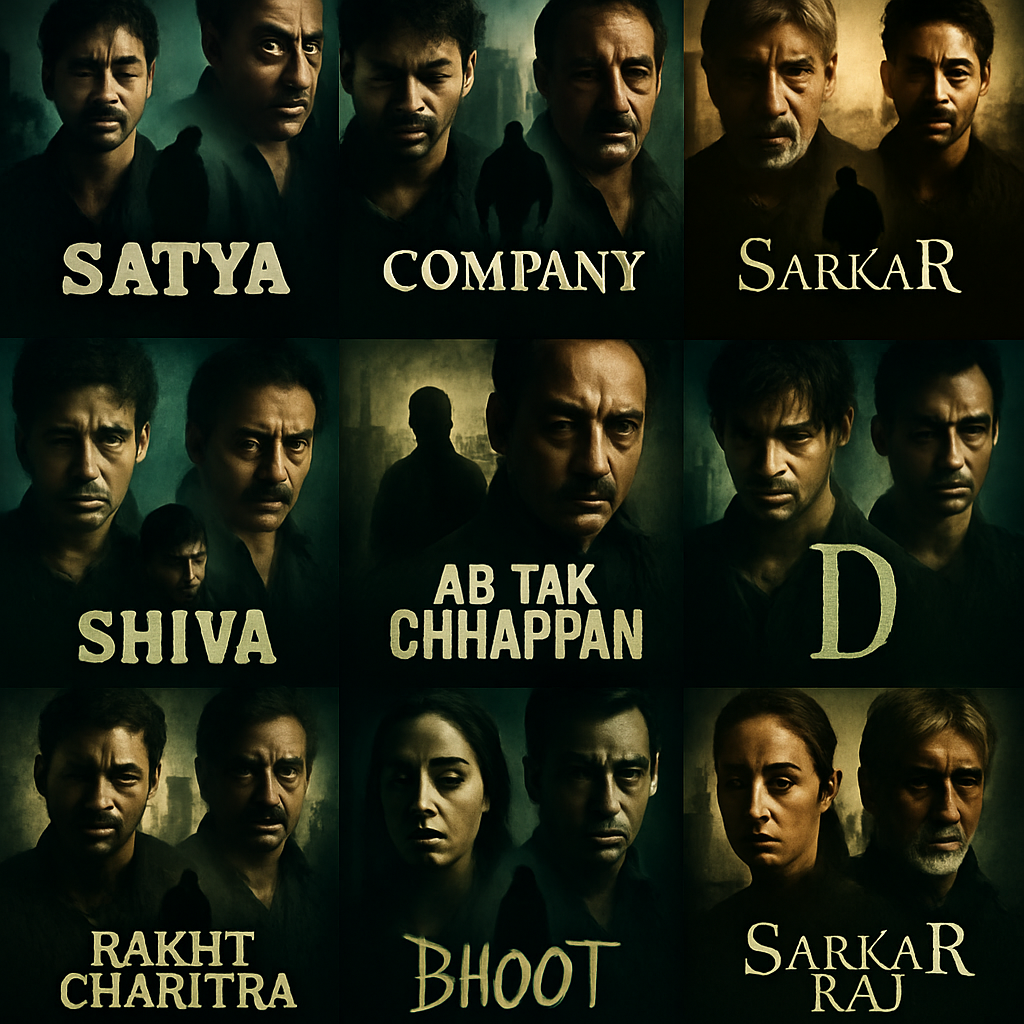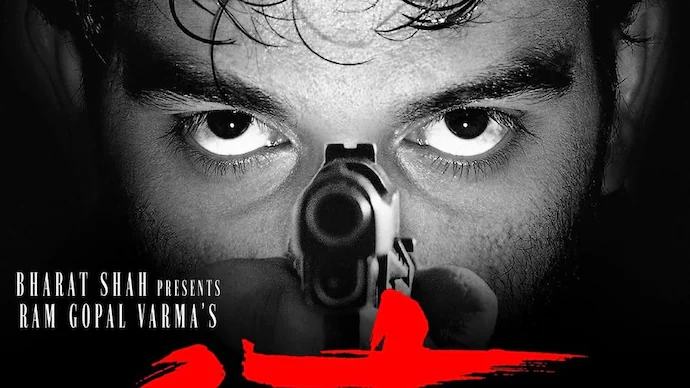
Ram Gopal Varma (RGV) is a critically acclaimed filmmaker known for revolutionizing the Bollywood crime thriller genre with his gritty, realistic, and psychologically intense films. His unique storytelling style focuses on the dark underbelly of urban India, blending moral ambiguity, raw violence, and intricate character studies. Below is an elaborated article of around 1100 words that explores ten of RGV’s crime thriller masterpieces, discussing their significance, narrative style, and impact on Indian cinema.
Ram Gopal Varma and the Crime Thriller Landscape in Bollywood
Ram Gopal Varma emerged in the early 1990s as a distinctive voice in Indian cinema, especially within the crime thriller niche. Unlike conventional Bollywood films, which often glamorized crime or superficially Indianized Western gangster motifs, RGV’s films brought a stark, almost documentary-like realism to the depiction of organized crime, political corruption, and psychological trauma. His narratives are often character-driven, layered with intense moral dilemmas and unfiltered portrayals of violence and betrayal. This has made him one of the most influential directors in the genre, inspiring new waves of filmmakers and setting new standards for storytelling in Bollywood.
1. Satya (1998) — The Benchmark of Realism in Gangster Films
“Satya” is widely regarded as RGV’s magnum opus and a watershed moment for Indian cinema’s depiction of the Mumbai underworld. The film tells the story of an innocent man who becomes embroiled in the chaotic and brutal criminal underworld of Mumbai. What sets “Satya” apart is its unparalleled realism — from the raw dialogues and naturalistic performances to its unglamorous, shadowy cinematography that evokes a documentary feel. Manoj Bajpayee’s chilling portrayal of Bhiku Mhatre, a violent gangster with a code of honor, became iconic and set a new standard for character depth in crime thrillers. The film’s exploration of themes such as loyalty, survival, and despair, along with Vishal Bhardwaj’s haunting background score, added immense power to its narrative. Its success redefined the gangster genre in Bollywood, influencing a generation of filmmakers.1
2. Company (2002) — Nuanced Portrayal of Organized Crime
Following the success of Satya, “Company” delves deeper into the examination of crime syndicates, focusing on the intricate power structures and betrayals within a Mumbai underworld organization. Ajay Devgn and Vivek Oberoi give unforgettable performances as the cold, strategic Malik and the ambitious but volatile Chandu. The screenplay’s complexity and authentic depiction of organized crime distinguish this film as more than an action drama; it is a cerebral exploration of power and loyalty. The film’s realistic dialogues and tension-filled narrative were inspired by real-life gang wars, lending credibility and gravitas that set it apart from typical masala thrillers. The film’s success further solidified RGV’s reputation as a specialist in gangster cinema.
3. Sarkar (2005) — The Indian Godfather
“Sarkar” is often cited as an Indian adaptation inspired by Francis Ford Coppola’s “The Godfather.” The film centers on Subhash Nagre, played with gravitas by Amitabh Bachchan, who rules Mumbai’s political and criminal landscape with an iron hand yet a morally complex approach. RGV explores themes of political corruption, family loyalty, and revenge, set against a background of shadowy power struggles. The film’s cinematic style—marked by moody lighting and impactful dialogue—creates a tense atmosphere where every conversation carries weight. Unlike typical Bollywood fare, “Sarkar” refrains from glamorizing its protagonist’s violence, instead inviting viewers to consider the ethical dilemmas surrounding power and justice. The film spawned two sequels and remains a touchstone for crime-politics dramas in Indian cinema.
4. Kaun? (1999) — Minimalist Psychological Suspense
“Kaun?” is a unique entry in RGV’s filmography—a tightly wound psychological thriller that unfolds entirely within the confines of a single house. Starring Urmila Matondkar and Manoj Bajpayee, the film creates suspense through dialogue, atmosphere, and carefully crafted misdirection, rather than relying on action sequences. Anurag Kashyap wrote the taut screenplay that keeps audiences guessing until the last moment. Its minimalist style, intense performances, and claustrophobic tension earned the film cult status, demonstrating RGV’s ability to innovate within the crime thriller framework by blending it with psychological elements.1
5. Shiva (1990, Hindi) — Raw and Energetic Debut in Bollywood
“Shiva” marked Ram Gopal Varma’s daring arrival in the Hindi film industry, portraying college politics fraught with violence and corruption. The film’s kinetic narrative, handheld camerawork, and realistic fight sequences were unprecedented for youth-centric thrillers in Bollywood at the time. “Shiva” gave audiences an unfiltered glimpse into the turbulent dynamics of student gangs and political ambitions, showcasing RGV’s flair for presenting violent realities with technical finesse and narrative energy.
6. Rakta Charitra (2010) — Unflinching Political Crime Saga
Based on true political events in Andhra Pradesh, “Rakta Charitra” is one of Varma’s most ambitious and brutal projects. Starring Vivek Oberoi and Tamil actor Suriya, this two-part saga delves into a cycle of vendetta and violence deeply rooted in themes of honor, revenge, and political upheaval. The film’s episodic and raw narrative style mirrors the chaotic nature of the real events it depicts. Known for its graphic violence and unflinching realism, “Rakta Charitra” offers little romanticism, instead immersing viewers in the harsh realities of Indian political crime.
7. Bhoot (2003) — Urban Horror Thriller with Crime Elements
Though primarily a horror film, “Bhoot” stands out for its strong thriller component and exploration of psychological tension in an urban setting. The story, set inside a haunted Mumbai apartment, explores paranoia, fear, and the breakdown of reality. The film’s tightly controlled pacing, ambient music, and use of a familiar, confined setting elevated the horror narrative by grounding it in everyday urban life. “Bhoot” avoided typical Bollywood horror clichés, influencing subsequent films that blend psychological thriller elements with supernatural suspense.
8. D (2005) — A Gritty Origin Story
“D” delves into the transformation of Dev, a small-time crook, into a formidable underworld don. As a spin-off to “Company,” it emphasizes subtle character development and psychological tensions over flamboyant violence. RGV manages to create an intense atmosphere through minimalist storytelling and an emphasis on internal conflict as Dev navigates his ascent to power. The restrained direction and focus on the cost of crime set “D” apart from over-the-top gangster movies, underlining RGV’s penchant for nuanced realism in the crime thriller genre.
9. Not a Love Story (2011) — Crime, Obsession, and Psychological Intensity
Inspired by the infamous Neeraj Grover murder, “Not a Love Story” is a grim tale of love turned obsessive and destructive. The film employs handheld camerawork, naturalistic performances, and tightly scripted scenes to create a sense of claustrophobia and urgency. Actor Mahie Gill’s portrayal of an obsessed lover and Deepak Dobriyal’s volatile character bring extraordinary psychological depth to this crime thriller. As an experimental movie, it blends romance and crime in a manner that challenges typical genre conventions, reflecting RGV’s continual quest for innovation.
10. Ek Hasina Thi (2004, Produced by RGV) — Noir Revenge Thriller
Though directed by Sriram Raghavan, “Ek Hasina Thi” carries significant RGV influence through his role as a producer. The film chronicles the story of a woman (Urmila Matondkar) who transforms from a victim into a calculating avenger after being betrayed by her lover, played by Saif Ali Khan. The noir aesthetics, sharp scripting, and complex characterization resonate strongly with Varma’s themes of moral ambiguity and justice. This thriller is widely respected for its female-centric narrative, stylish execution, and powerful performances, standing out as a landmark revenge thriller in Bollywood.
Impact and Legacy
Ram Gopal Varma’s crime thrillers stand out for their stark realism, complex characters, and psychological depth. He helped dismantle Bollywood’s previous glossy, formulaic portrayal of crime, infusing his films with gritty authenticity and technical innovation. His use of handheld cameras, natural lighting, and urban settings brought a documentary-style immediacy to his narratives, many of which are inspired by real events and grounded in social realities.
His films also elevated actors like Manoj Bajpayee and Vivek Oberoi, who brought nuanced performances to roles that might have otherwise been stereotypical. Moreover, RGV’s willingness to experiment with structure and minimalism—as seen in “Kaun?” and “Not a Love Story”—expanded the possibilities within the crime thriller genre beyond conventional action and melodrama.
Overall, RGV’s contribution to Bollywood is immense: he not only created some of the most enduring crime thrillers in Indian cinema but also inspired a new generation of filmmakers to approach the genre with honesty and complexity.
This detailed exploration of Ram Gopal Varma’s critically acclaimed crime thrillers underscores his unmatched influence on Bollywood’s cinematic landscape, highlighting ten films pivotal to this transformative journey. These works continue to be studied and celebrated for their innovative narrative techniques, moral inquiry, and unflinching depiction of crime.



